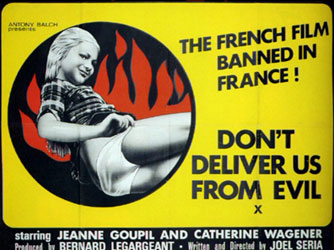 Yet another film whose reputation precedes it. 1971’s DON’T DELIVER US FROM EVIL, about teen girls who dedicate themselves to evil, was banned in France for eight months, and wasn’t distributed in the U.S. until much later. Now that this notorious work has finally been unveiled, the furor is revealed as much ado about very little.
Yet another film whose reputation precedes it. 1971’s DON’T DELIVER US FROM EVIL, about teen girls who dedicate themselves to evil, was banned in France for eight months, and wasn’t distributed in the U.S. until much later. Now that this notorious work has finally been unveiled, the furor is revealed as much ado about very little.
1971’s DON’T DELIVER US FROM EVIL, about teen girls who dedicate themselves to evil, was banned in France for eight months, and wasn’t distributed in the USA until much later.
DON’T DELIVER US FROM EVIL (MAIS NE NOUS DELIVREZ PAS DU MAL—literally BUT DO NOT DELIVER US FROM EVIL) was the filmmaking debut of actor Joel Seria. His inspiration was the Parker-Hulme murder that occurred in New Zealand in 1954; its perpetrators were Pauline Parker and Juliet Hulme, teenagers who indulged a shared fantasy world and then murdered Parker’s mother when it seemed the two might be split up. The case was the inspiration for Peter Jackson’s HEAVENLY CREATURES (1994), a more literal dramatization than DON’T DELIVER US FROM EVIL (whose lead actresses were both in their twenties at the time of filming), and also a much better film.
His inspiration was the Parker-Hulme murder that occurred in New Zealand in 1954; its perpetrators were Pauline Parker and Juliet Hulme, teenagers who indulged a shared fantasy world and then murdered Parker’s mother when it seemed the two might be split up.
Seria’s film nevertheless became a minor cause celebre when released in England, courtesy of the legendary avant-garde filmmaker/distributor Anthony Balch. It was Balch who was responsible for the irresistible tagline “A French film banned in France!”
“A French film banned in France!”
Anne is a dissatisfied Catholic schoolgirl who befriends the equally dissatisfied Lore. In rebellion against the strict moral codes of their superiors, the girls dedicate themselves to evil.
During the summer Anne and Lore live at their respective homes, where they torture cats and steal church wafers, which they use in satanic rituals. They also seduce the retarded gardener but he becomes violent and abusive. The girls retaliate by killing his pet bird.
Anne and Lore try the seduction gambit again, this time on a middle-aged man they invite to Anne’s house one night when her parents are out. Again, however, the man becomes overexcited, and Anne bashes his head in with a heavy log.
Anne and Lore do their best to cover up the killing, but both realize that capture is inevitable. Worse, they stand to be split up, a fate neither can bear. They decide to commit joint suicide, and do so during a children’s play. In the midst of the performance the girls take the stage, recite a Baudelaire poem and incinerate themselves before the stunned audience.
I find this film dull and excessively drawn-out, although that might be because I’m not Catholic. It seems lapsed Catholics respond best to DON’T DELIVER US FROM EVIL; that includes the English crime writer Paul Buck, who provides an enthusiastic dissertation of the film on the Mondo Macabro DVD, claiming it made him flash back on his own Catholic upbringing. For his part, writer-director Joel Seria claims the film’s oppressive Catholic boarding school was taken directly from his own childhood.
It seems lapsed Catholics respond best to DON’T DELIVER US FROM EVIL…
To be fair, the film isn’t all bad. The early scenes set a hypnotic tone, with the two girls in bed, whispering under the covers. This heralds an aura of secrets and intrigue, bolstered by languid pacing and much lingering, fetishistic imagery. This doesn’t make for a terribly exciting film, especially since the story is so painfully thin—and just as painfully drawn-out. Whatever shock value it might once have possessed has long since worn off, leaving a mildly interesting relic that’s best viewed as a warm-up for HEAVENLY CREATURES, which is everything DON’T DELIVER US FROM EVIL wants to be.
Vital Statistics
DON’T DELIVER US FROM EVIL (MAIS NE NOUS DELIVREZ PAS DU MAL)
Societe Generale De Production/Productions Tanit
Director: Joel Seria
Producer: Bernard Legargeant
Screenplay: Joel Seria
Cinematography: Marcel Combes
Editing: Philippe Gosselet
Cast: Jeanne Goupil, Catherine Wagener, Bernard Dheran, Michael Robin, Gerard Darrieu, Marc Dudicourt, Veronique Silver, Jean-Pierre Helbert, Nicole Merouze, Henri Poirier, Serge Frederic, Rene Berthier, Frederic Nort
